Publications
For submission of articles or Working Papers to CEsA, please send an email to:
comunicacao@cesa.iseg.ulisboa.pt
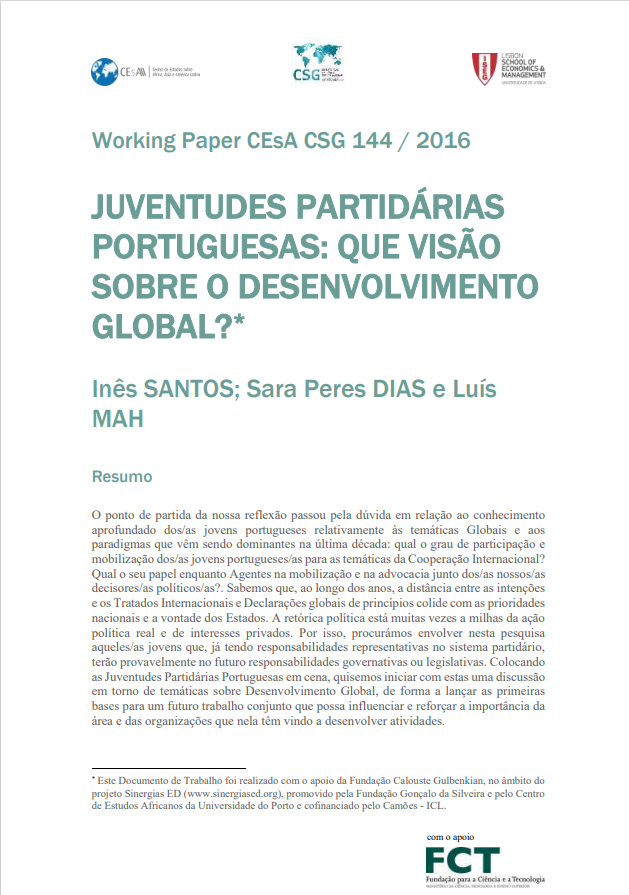
Working Paper 144/2016: Juventudes partidárias portuguesas: que visão sobre o desenvolvimento global?
Abstract:
The starting point of Juventudes partidárias portuguesas : que visão sobre o desenvolvimento global? was the doubt regarding the in-depth knowledge of Portuguese young people regarding Global themes and the paradigms that have been dominant in the last decade: what is the degree of participation and mobilization of Portuguese young people to the themes of International Cooperation? What is your role as Agents in mobilizing and advocating for our policy makers? We know that, over the years, the distance between intentions and International Treaties and global Declarations of Principles collides with national priorities and the will of States. Political rhetoric is often miles from real political action and private interests. Therefore, we sought to involve in this research those young people who, already having representative responsibilities in the party system, will probably have governmental or legislative responsibilities in the future. Putting the Portuguese Party Youth on the scene, we wanted to start with them a discussion around Global Development themes, in order to lay the first bases for a future joint work that can influence and reinforce the importance of the area and the organizations that have been coming to it. to develop activities.
Quotation:
Santos, Inês, Sara Peres Dias e Luís Mah (2016). “Juventudes partidárias portuguesas : que visão sobre o desenvolvimento global?”. Instituto Superior de Economia e Gestão – CEsA / CSG – Documentos de Trabalho nº 144/2016.
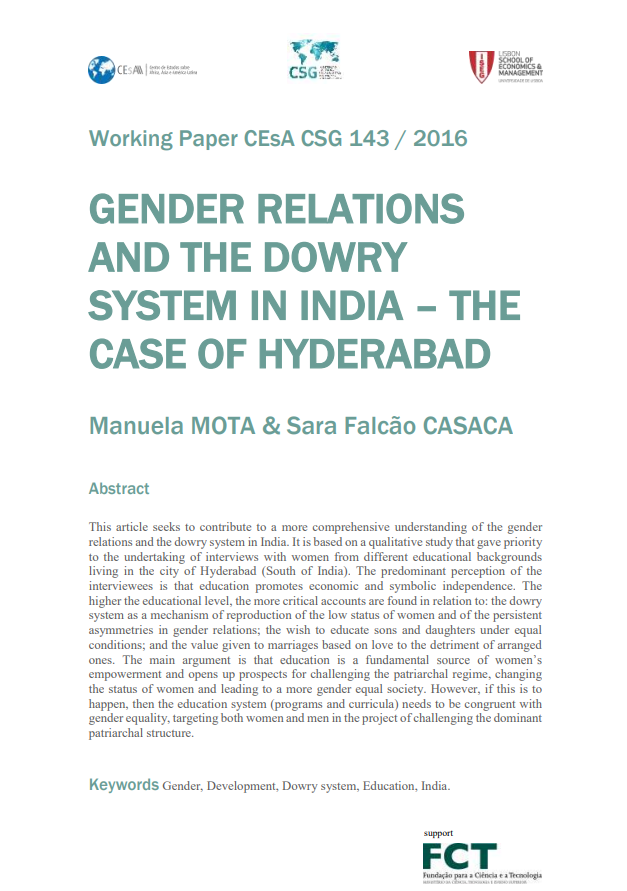
Working Paper 143/2016: Gender relations and the dowry system in India: the case of Hyderabad
Abstract:
This article seeks to contribute to a more comprehensive understanding of the gender relations and the dowry system in India. It is based on a qualitative study that gave priority to the undertaking of interviews with women from different educational backgrounds living in the city of Hyderabad (South of India). The predominant perception of the interviewees is that education promotes economic and symbolic independence. The higher the educational level, the more critical accounts are found in relation to: dowry as a mechanism of reproduction of the low status of women and of the persistent asymmetries in gender relations; the wish to educate sons and daughters under equal conditions; and the value given to marriages based on love to the detriment of arranged ones. The main argument is that education is a fundamental source of women’s empowerment and opens up prospects for challenging the patriarchal regime, changing the status of women and leading to a more gender equal society. However, if this is to happen, then the education system (programs and curricula) needs to be congruent with gender equality, targeting both women and men in the project of challenging the dominant patriarchal structure.
Quotation:
Mota, Manuela e Sara Falcão Casaca (2016). “Gender relations and the dowry system in India: the case of Hyderabad”. Instituto Superior de Economia e Gestão – CEsA/ CSG – Documentos de Trabalho nº 143/2016.
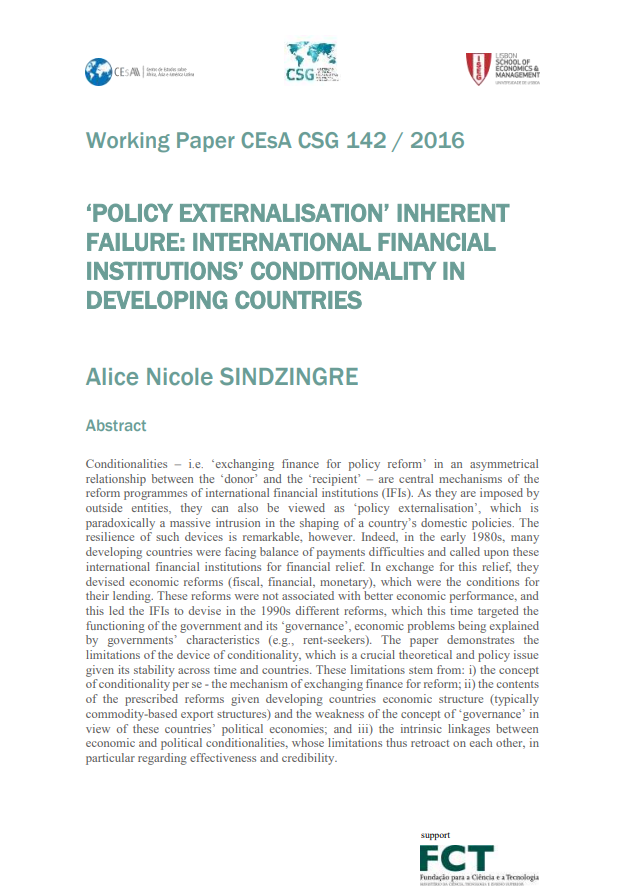
Working Paper 142/2016: ‘Policy externalisation’ inherent failure: international financial institutions’ conditionality in developing countries
Abstract:
Conditionalities – i.e. ‘exchanging finance for policy reform’ in an asymmetrical relationship between the ‘donor’ and the ‘recipient’ – are central mechanisms of the reform programmes of international financial institutions (IFIs). As they are imposed by outside entities, they can also be viewed as ‘policy externalisation’, which is paradoxically a massive intrusion in the shaping of a country’s domestic policies. The resilience of such devices is remarkable, however. Indeed, in the early 1980s, many developing countries were facing balance of payments difficulties and called upon these international financial institutions for financial relief. In exchange for this relief, they devised economic reforms (fiscal, financial, monetary), which were the conditions for their lending. These reforms were not associated with better economic performance, and this led the IFIs to devise in the 1990s different reforms, which this time targeted the functioning of the government and its ‘governance’, economic problems being explained by governments’ characteristics (e.g., rent-seekers). Policy externalisation’s inherent failure: international financial institutions’ conditionality in developing countries demonstrates the limitations of the device of conditionality, which is a crucial theoretical and policy issue given its stability across time and countries. These limitations stem from: i) the concept of conditionality per se – the mechanism of exchanging finance for reform; ii) the contents of the prescribed reforms given developing countries economic structure (typically commodity-based export structures) and the weakness of the concept of ‘governance’ in view of these countries’ political economies; and iii) the intrinsic linkages between economic and political conditionalities, whose limitations thus retroact on each other, in particular regarding effectiveness and credibility.
Quotation:
Sindzingre, Alice Nicole (2016). ‘Policy externalisation’s inherent failure: international financial institutions’ conditionality in developing countries”. Instituto Superior de Economia e Gestão – CEsA/ CSG – Documentos de Trabalho nº 142/2016.
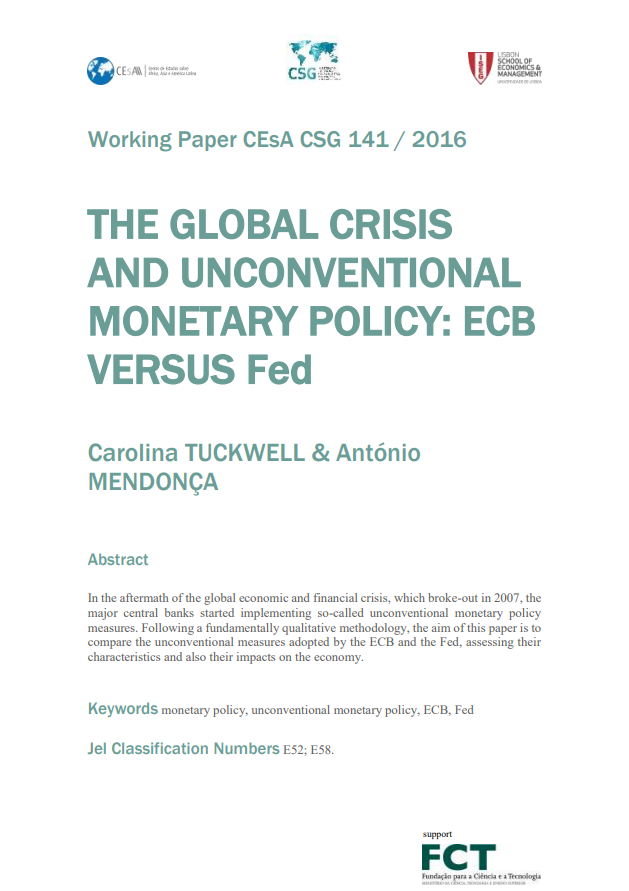
Working Paper 141/2016: The global crisis and unconventional monetary policy: ECB versus Fed
Abstract:
The global financial crisis arose in August of 2007, as a result of the burst of the housing bubble in the US, and then spread to the euro area – where it took the form of a sovereign debt crisis after 2010 – and to the rest of the globe. In its aftermath, the major central banks, such as the ECB and the Fed, started implementing the so-called unconventional monetary policy measures, as a response. The major aim of The global crisis and unconventional monetary policy: ECB versus Fed is to compare the unconventional measures adopted by these two central banks. The unconventional measures referred to will be those that are not part of the conventional monetary policy tools of each bank and that were specifically used to address the global financial crisis and the sovereign debt crisis. Concerning the specific objectives of this paper, firstly, it aims to assess the formal and conceptual differences between the unconventional measures adopted by both central banks. This includes understanding how the measures themselves differ from bank to bank and what their aims and areas of intervention are. Additionally, the intent of the unconventional measures in simply aiding the transmission of the monetary policy stance, or as a form of further stimulating the economies is also considered. The final aspect of the formal and conceptual comparison includes determining how these measures fit in the concepts of “quantitative easing” and “credit easing”. In connection to those concepts, the paper also intends to compare the impacts of these unconventional measures on the balance sheet of each bank, both in quantitative terms (size) and qualitative terms (composition).
Quotation:
Tuckwell, Carolina e António Mendonça (2016). “The global crisis and unconventional monetary policy: ECB versus Fed”. Instituto Superior de Economia e Gestão – CEsA/ CSG – Documentos de Trabalho nº 141/2016.
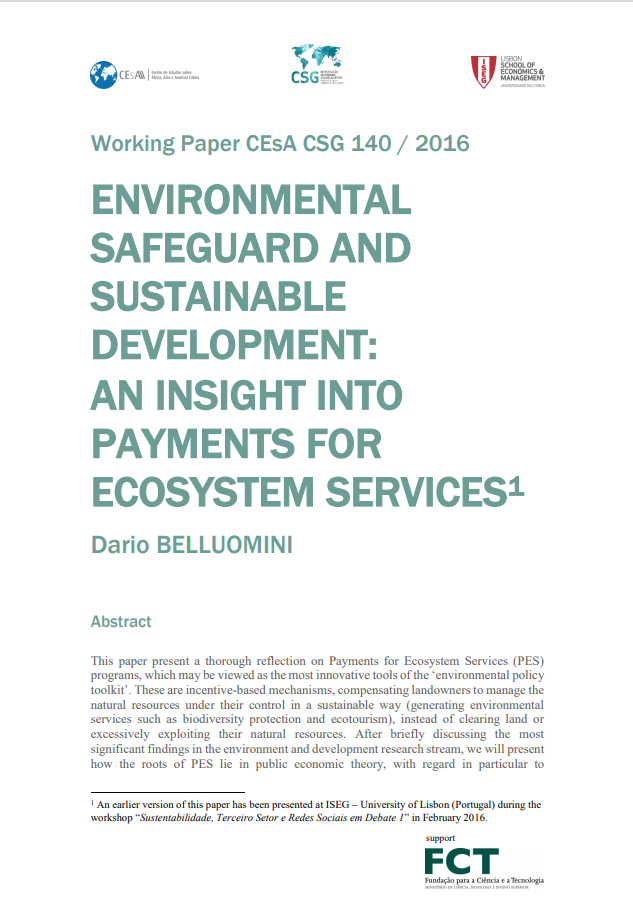
Working Paper 140/2016: Environmental safeguard and sustainable development: an insight into payments for ecosystem services
Abstract:
Environmental safeguard and sustainable development: an insight into payments for ecosystem services presents a thorough reflection on Payments for Ecosystem Services (PES) programs, which may be viewed as the most innovative tools of the ‘environmental policy toolkit’. These are incentive-based mechanisms, compensating landowners to manage the natural resources under their control in a sustainable way (generating environmental services such as biodiversity protection and ecotourism), instead of clearing land or excessively exploiting their natural resources. After briefly discussing the most significant findings in the environment and development research stream, we will present how the roots of PES lie in public economic theory, with regard in particular to environmental externalities. Later, after debating the proper definition of PES and its main concepts (e.g. additionality, perverse incentives, conditionality), we shall also comment the main case-studies on the topic, in order to provide clear examples of how these instruments may be applied in several different context (i.e. both in developing and developed countries, either by public or private agents). As it shall be shown, given their high adaptability to local conditions, PES are likely to become extremely important in next decades’ environment safeguard interventions.
Quotation:
Belluomini, Dario (2016). “Environmental safeguard and sustainable development: an insight into payments for ecosystem services”. Instituto Superior de Economia e Gestão – CEsA/CSG Documentos de Trabalho nº 140-2016.
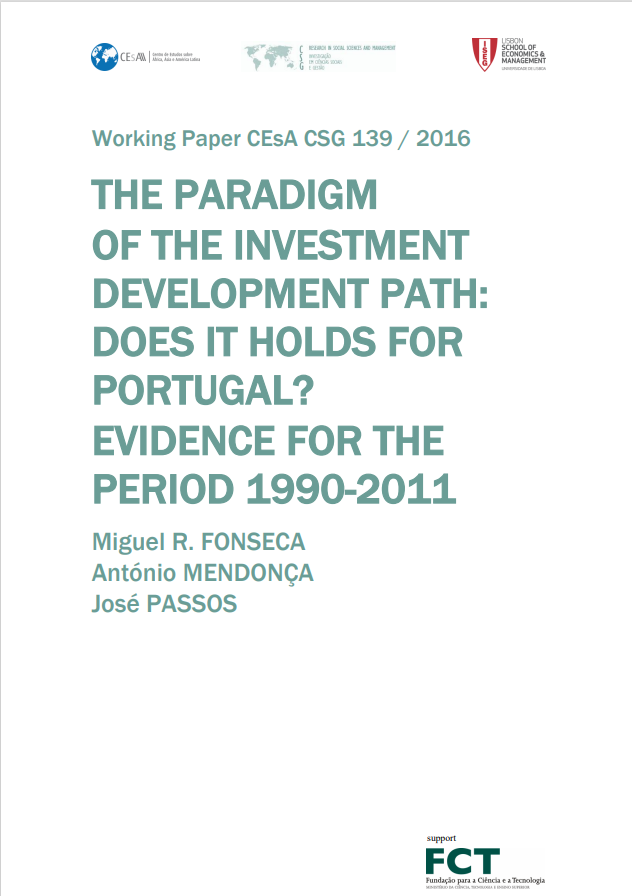
Working Paper 139/2016: The paradigm of the investment development path: does it holds for Portugal? Evidence for the period 1990-2011
Abstract:
The main goal of The paradigm of the investment development path: does it holds for Portugal? Evidence for the period 1990-2011 is to discuss the validity of the Investment Development Path Hypothesis for Portugal, with reference to the historical period 1960-2011. Looking at the transformations that took place in the world economy in the last quarter of the 20th century, as a result of liberalization, deregulation and market opening process, one of the most striking features was the emergence of multinational enterprises in all sectors and countries of the world. Consequently, the Foreign Direct Investment flows promoted by these firms have grown significantly, even faster than world trade and world output, in the same period. According to the Investment Development Path (IDP) theory there is a dynamic and intertemporal relationship between an economy’s level of development and the country’s inward and outward investment position. In this paper we estimate this hypothesis for Portugal and other 28 countries in different stages of development, for the period 1990-2011 at an aggregate level. We use fixed- effects panel data models and generally our research´s results provide support to the IDP theoretical paradigm, although we couldn’t capture all the stages predicted, given the lack of heterogeneity between the most countries of our sample and also the relatively short time period considered.
Quotation:
Fonseca, Miguel, António Mendonça e José Passos. 2016. “The paradigm of the investment development path: does it holds for Portugal? Evidence for the period 1990-2011”. Instituto Superior de Economia e Gestão – CEsA / CSG Documentos de Trabalho nº 139/2016.
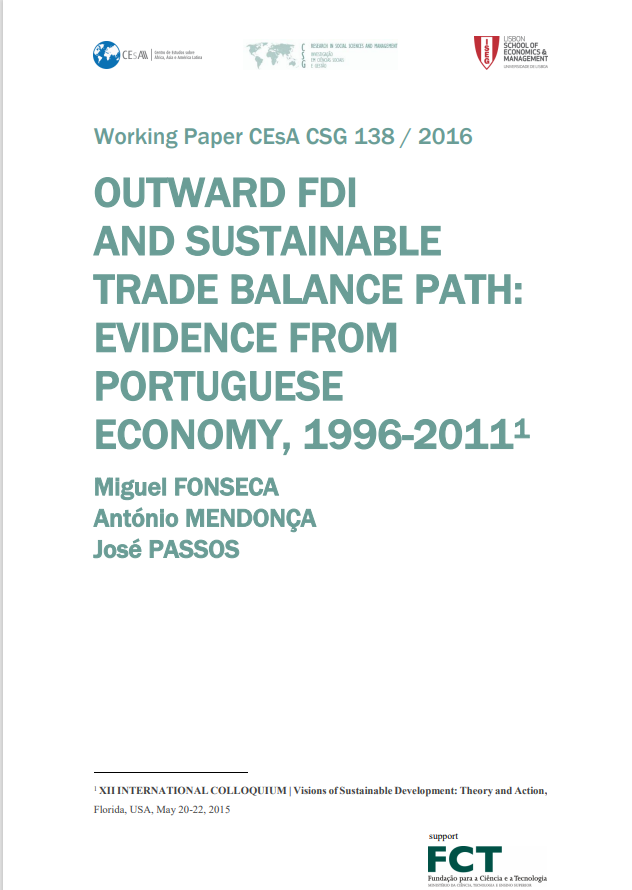
Working Paper 138/2016: Outward FDI and sustainable trade balance path: evidence from portuguese economy, 1996-2011
Abstract:
In the last two decades the internationalisation of the Portuguese economy increased, particularly through outward FDI on the Portuguese-speaking countries. Different studies in economic literature conclude for the existence of a complementary relationship between foreign production and trade in traditional outward investing economies, contributing to the long term sustainable path of the country’s trade balance. In our paper we discuss if this hypothesis holds for a new outward investor like Portugal, with reference to the period 1996-2011. We use a panel data analysis within a framework of gravity models for exports and imports, with a sample composed by EU-15, U.S.A., Brazil, Angola, Spain, Japan and China. Our main conclusion is that the Portuguese outward FDI seems to be negatively related to exports, suggesting a substitution effect, and thus a negative trade balance effect, for the majority of countries in our sample. The exception to this tendency seems to be Spain, confirming and reinforcing a former study for the period 1996-2007. Angola also reveals a positive effect on exports but, in this case, the effect on imports outweighs that on exports, contradicting the results obtained in that same former study. The results we achieved in Outward FDI and sustainable trade balance path : evidence from portuguese economy, 1996-2011 suggest that the expected positive impact on home country´s trade of the increased internationalisation of the Portuguese economy as an exporter of capital, on the last fifteen years, is not evident and continue to be not predicable with certainty relying on empirical evidence.
Quotation:
Fonseca, Miguel, António Mendonça e José Passos (2016). “Outward FDI and sustainable trade balance path : evidence from portuguese economy, 1996-2011”. Instituto Superior de Economia e Gestão – CEsA / CSG – Documentos de Trabalho nº 138/2016
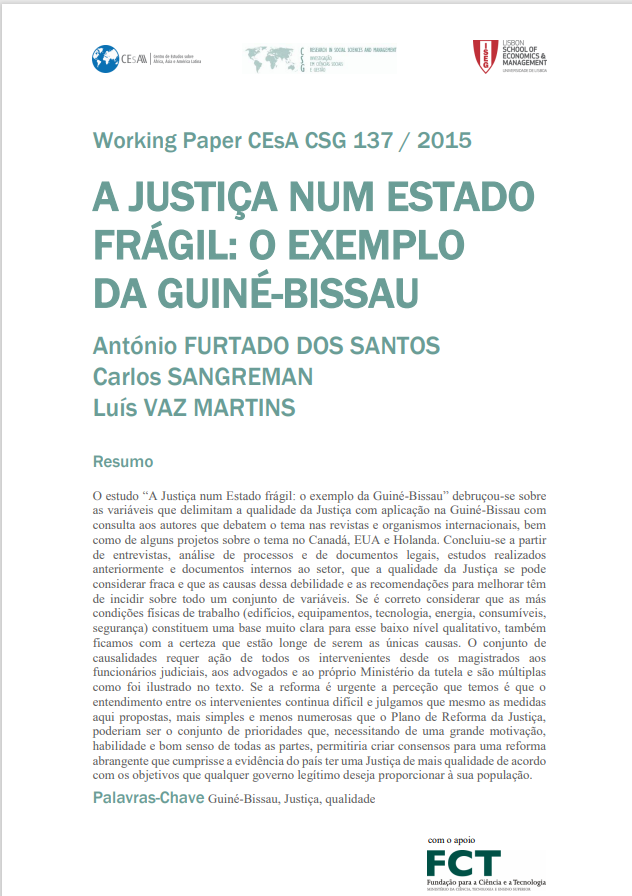
Working Paper 137/2015: A justiça num estado frágil: o exemplo da Guiné-Bissau
Abstract:
The study A Justiça num Estado frágil: o exemplo da Guiné-Bissau leaned on the variables that define the quality of justice with application in Guinea-Bissau consultation with authors to discuss the topic in magazines and international organizations, as well as some projects on the topic in Canada, USA and the Netherlands. It was conducted with interviews, analysis of processes and legal documents, previous studies and internal documents and detailed that the quality of justice can be considered weak and that the causes of this weakness and recommendations to improve have to focus on a whole range variables. If it is correct to consider that the poor physical conditions of work (buildings, equipment, technology, energy, consumables and security) are a very clear basis for this low level of quality, also we are sure that these causes are far from to be the only ones. The set of causalities requires action by all stakeholders from the magistrates to court officials, lawyers and the Ministry of Justice itself are manifold as illustrated in the text. If the reform is urgent the perception we have is that the understanding between the parties remains difficult and we believe that even the measures proposed here, simpler and less numerous than the Reform Plan of Justice, could be the set of priorities, requiring a great motivation, skill and good sense to all parties, would create consensus for a comprehensive reform that fulfills the evidence of the country have a higher quality of justice in accordance with the objectives that any legitimate government wants to provide its population.
Quotation:
Santos, António Furtado dos, Carlos Sangreman e Luís Vaz Martins (2015) . “A justiça num estado frágil : o exemplo da Guiné-Bissau”. Instituto Superior de Economia e Gestão – CEsA / CSG – Documentos de Trabalho nº 137/2015
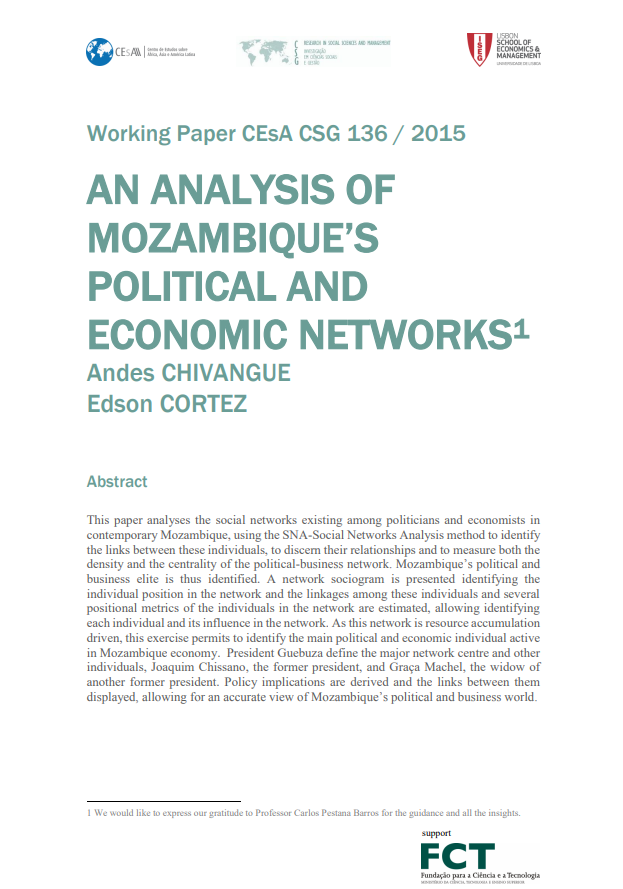
Working Paper 136/2015: An analysis of Mozambique’s political and economic networks
Abstract:
An analysis of Mozambique’s political and economic networks analyses the social networks existing among politicians and economists in contemporary Mozambique, using the SNA-Social Networks Analysis method to identify the links between these individuals, to discern their relationships and to measure both the density and the centrality of the political-business network. Mozambique’s political and business elite is thus identified. A network sociogram is presented identifying the individual position in the network and the linkages among these individuals and several positional metrics of the individuals in the network are estimated, allowing identifying each individual and its influence in the network. As this network is resource accumulation driven, this exercise permits to identify the main political and economic individual active in Mozambique economy. President Guebuza define the major network centre and other individuals, Joaquim Chissano, the former president, and Graça Machel, the widow of another former president. Policy implications are derived and the links between them displayed, allowing for an accurate view of Mozambique’s political and business world. The motivation for the present research is as follows: firstly, although there is some research in Mozambique, the relationship between political power and economic power is similar to those found in other contemporary countries, and therefore it is interesting to discover who the prominent individuals are and what role they play in the network; secondly, although there has been some research conducted into Mozambican politics and business, the SNA methodology has so far not been used to describe Mozambique. Finally, the paper also seeks to measure both the centrality and the density of this network.
Quotation:
Chivangue, Andes e Edson Cortez (2015). “An analysis of Mozambique’s political and economic networks”. Instituto Superior de Economia e Gestão – CEsA / CSG – Documentos de Trabalho nº 136/2015.
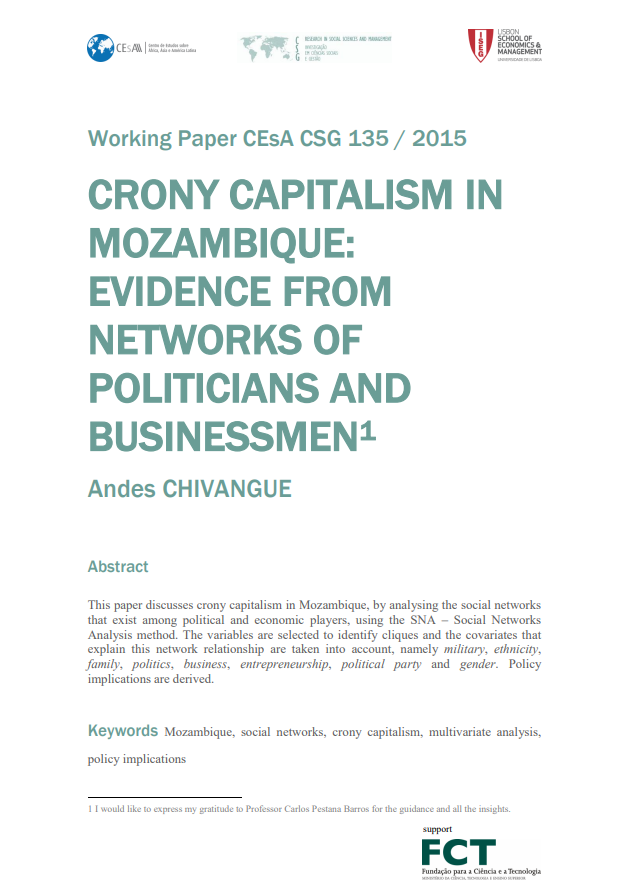
Working Paper 135/2015: Crony capitalism in Mozambique: evidence from networks of politicians and businessmen
Abstract:
Crony capitalism in Mozambique: evidence from networks of politicians and businessmen discusses crony capitalism in Mozambique, analysing the existing social networks between political and economic actors, using the SNA – Social Networks Analysis method. Variables are selected to identify cliques and covariates that explain this network relationship are taken into account, namely, military, ethnicity, family, politics, business, entrepreneurship, political party and gender. The policy implications are derived. Crony capitalism is a concept often used to analyse the Asian political economy. Recently it has been used to describe entrepreneurship in Africa. This paper tests some of the variables associated with this phenomenon in Mozambique, using SNA – Social Network Analysis (Prell 2012) and regressing the formation of ties within the network against variables that can lead to crony situations, identifying those that explain tie formation. This research is based on the fact that in African countries, wealth accumulation is still in its early stages, and power is based on political relationships. This paper tests some of the variables associated with this phenomenon in Mozambique, using SNA – Social Network Analysis (Prell 2012) and regressing the formation of ties within the network against variables that may lead to timing situations, identifying those that explain the formation of ties. This research is based on the fact that, in African countries, wealth accumulation is still in its early stages, and power is based on political relationships.
Quotation:
Chivangue, Andes (2015). “Crony capitalism in Mozambique: evidence from networks of politicians and businessmen”. Instituto Superior de Economia e Gestão – CEsA / CSG – Documentos de Trabalho nº 135/2015.





